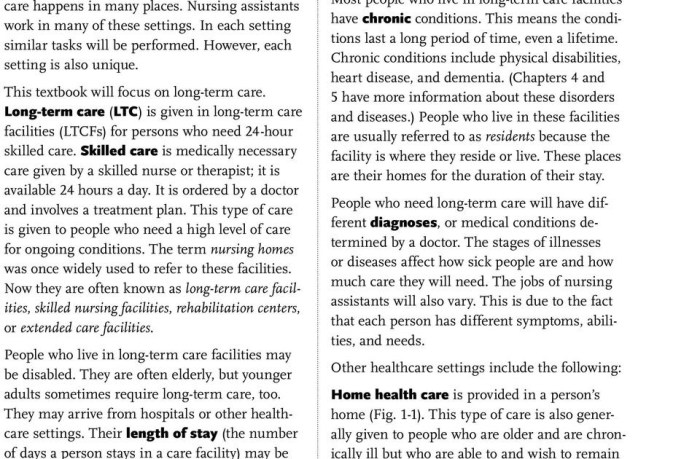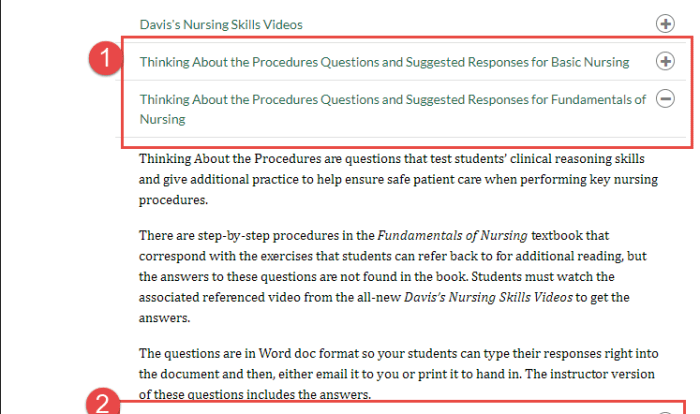Dive into Hartman’s Nursing Assistant Care Workbook Answers Chapter 3 and gain invaluable insights into the fundamental principles of nursing assistance. This comprehensive guide delves into the core concepts, equipping you with the knowledge and skills necessary to provide exceptional patient care.
Throughout this chapter, we will explore the rights and responsibilities of patients, effective communication techniques, infection control practices, personal care principles, and more. Each topic is presented in a clear and concise manner, ensuring a deep understanding of the essential aspects of nursing assistance.
Chapter Overview

Chapter 3 of Hartman’s Nursing Assistant Care Workbook covers the foundational principles and practices of nursing assistance. It explores the rights and responsibilities of patients, effective communication techniques, infection control practices, personal care, mobility assistance, nutrition and hydration, elimination, skin care, vital signs monitoring, and reporting and documentation.
Understanding these concepts is crucial for nursing assistants to provide safe and compassionate care.
Patient Rights and Responsibilities
Patients have the right to receive respectful and ethical care that respects their autonomy, dignity, and privacy. Nursing assistants play a vital role in upholding these rights by providing care that is individualized and tailored to the patient’s needs and preferences.
They must also respect patient confidentiality and maintain a professional and respectful demeanor at all times.
Communication Techniques
Effective communication is essential for building rapport with patients and ensuring their understanding of care plans. Nursing assistants must use clear and concise language, actively listen to patients’ concerns, and respond with empathy and understanding. Nonverbal communication, such as maintaining eye contact and using appropriate body language, also plays a crucial role in establishing trust and rapport.
Infection Control Practices
Infection control is paramount in nursing care to prevent the spread of infection and protect both patients and healthcare providers. Chapter 3 Artikels essential infection control procedures, including hand hygiene, proper use of personal protective equipment (PPE), and disinfection of equipment and surfaces.
Nursing assistants must strictly adhere to these practices to maintain a clean and safe environment for patients.
Personal Care
Providing personal care is a fundamental aspect of nursing assistance. Chapter 3 covers the principles of personal care, including bathing, dressing, and toileting. Nursing assistants must ensure that patients receive appropriate and individualized care that maintains their comfort, dignity, and well-being.
Mobility Assistance
Assisting patients with mobility is essential for their safety and well-being. Chapter 3 discusses different methods of assisting patients with mobility, such as transferring patients, using assistive devices, and providing support during ambulation. Nursing assistants must be skilled in these techniques to ensure patient safety and prevent injuries.
Nutrition and Hydration
Adequate nutrition and hydration are crucial for patient recovery and well-being. Chapter 3 discusses the nutritional needs of patients and the role of nursing assistants in ensuring they receive appropriate nourishment. Nursing assistants must monitor patients’ nutritional status, assist with feeding, and provide education on healthy eating habits.
Elimination
Assisting patients with elimination is an important aspect of nursing care. Chapter 3 covers the different types of elimination and the nursing assistant’s role in assisting with elimination. Nursing assistants must be skilled in collecting and disposing of urine and stool specimens and providing appropriate care for patients with incontinence.
Skin Care
Maintaining healthy skin is essential for patient comfort and well-being. Chapter 3 discusses the importance of skin care and provides guidelines for assessing and caring for different skin types. Nursing assistants must be skilled in providing appropriate skin care to prevent skin breakdown and promote patient comfort.
Vital Signs
Monitoring vital signs is essential for assessing patient health status and detecting potential complications. Chapter 3 discusses the importance of monitoring vital signs, including temperature, pulse, respirations, and blood pressure. Nursing assistants must be skilled in accurately measuring and recording vital signs and reporting any abnormalities to the nurse.
Reporting and Documentation, Hartman’s nursing assistant care workbook answers chapter 3
Accurate reporting and documentation are crucial for effective patient care. Chapter 3 discusses the different types of documentation used in nursing and the importance of completing them accurately and thoroughly. Nursing assistants must be skilled in documenting patient care, including observations, interventions, and patient responses.
Common Queries: Hartman’s Nursing Assistant Care Workbook Answers Chapter 3
What are the key principles of personal care for patients?
Personal care involves maintaining the patient’s hygiene, comfort, and dignity. It includes activities such as bathing, dressing, and toileting, and is essential for promoting well-being and preventing complications.
How can nursing assistants effectively establish rapport with patients?
Building rapport is crucial for fostering trust and collaboration. Effective communication techniques, such as active listening, empathy, and a respectful demeanor, can help nursing assistants establish positive relationships with patients.



